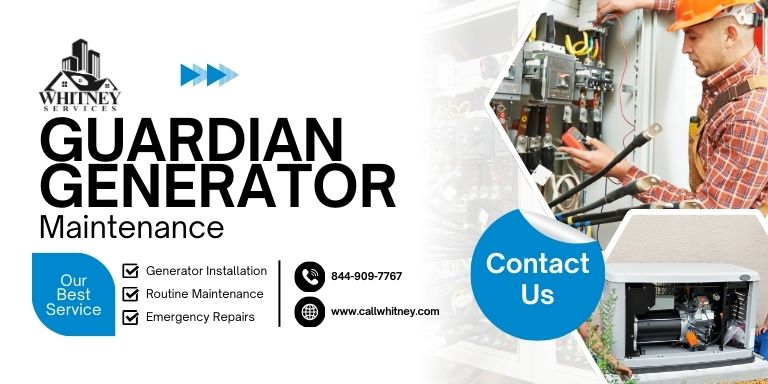A standby system is only reliable if it’s maintained. Homeowners often focus on installation but overlook the ongoing care that keeps their units ready when outages strike. Regular Guardian generator maintenance is the single most important factor in ensuring dependable performance, especially in climates as different as Michigan and Florida.
Whitney Services provides tailored maintenance programs to keep Guardian systems operational through harsh winters and intense hurricane seasons.
Why Routine Maintenance Matters
Even though Guardian systems run automatically, they are mechanical equipment that require periodic care. Without regular attention, common issues include:
- Battery failure during cold starts
- Oil breakdown from extended idling
- Corrosion in high-humidity environments
- Fuel system blockages from long storage periods
- Controller or sensor faults from power surges
Scheduled upkeep protects your investment, keeps warranties valid, and ensures your generator starts when you need it most.
Core Tasks in a Generator Service Plan
Whitney Services offers full service plans that follow manufacturer recommendations, which include:
- Oil and filter change (every 100–200 hours of runtime or annually)
- Air filter replacement
- Spark plug inspection and replacement
- Battery and charging system check
- Coolant (liquid-cooled models) or fan inspection (air-cooled)
- Automatic transfer switch testing
- Firmware updates and Wi-Fi monitoring setup
- Load bank testing to verify full operational capacity
Each visit also includes a complete system cleaning and visual safety inspection.
Seasonal Generator Checks for Michigan Homes
Cold-climate upkeep focuses on preventing freeze-related failures. In Michigan, Whitney Services performs:
- Cold-weather kit checks — Battery warmers, oil heaters, and insulated enclosures must function before winter
- Fuel pressure testing — Natural gas pressure can drop during peak demand
- Exhaust clearance inspection — Snowdrifts must not block vents or air intakes
- Battery load testing — Cold temperatures reduce starting power
We recommend a seasonal generator check in late autumn, before temperatures consistently drop below freezing.
Seasonal Generator Checks for Florida Homes
Humidity, heat, and salt air create different risks in Florida. Maintenance here targets corrosion and cooling performance:
- Terminal and connection corrosion removal
- Fan and cooling shroud cleaning for proper airflow
- Enclosure integrity inspection for salt-related pitting or rust
- Fuel line leak checks due to heat expansion and contraction
- Storm-readiness testing before the start of hurricane season
A pre-hurricane inspection in late spring prepares systems for Florida’s most outage-prone months.
Annual Inspections and Service Intervals
- At least once per year: Required for warranty compliance
- After every 200 hours of runtime: Full oil and filter service
- After any major storm event: Post-storm inspection for water intrusion, debris, and electrical surge damage
Whitney Services tracks service intervals for our clients and schedules visits proactively, so homeowners don’t need to worry about missing critical upkeep.
Guardian Generator Maintenance Schedule
(Recommended by Whitney Services)
Interval | Tasks | Notes for Michigan | Notes for Florida |
Monthly (self-check) | • Visual inspection for leaks or damage • Run weekly self-test cycle • Check Wi-Fi connection and alerts | Do this even if temperatures are below freezing. | Do this during cooler parts of the day to avoid overheating. |
Seasonally (2× per year) | • Clean exterior and remove debris • Check battery voltage and charger • Inspect air filter • Verify fuel supply pressure | Autumn check ensures cold-start readiness. | Late spring check ensures hurricane readiness. |
Annually (required) | • Oil and filter change • Spark plug inspection/replacement • Full load bank test • Automatic transfer switch test • Firmware update | Schedule before winter storms peak (Nov–Dec). | Schedule before hurricane season (May–June). |
Every 200 run hours | • Full service (oil, filters, plugs, coolant/air cooling system) | After long snowstorm outages. | After multi-day hurricane outages. |
Whitney Services tracks service intervals for clients and sends reminders so maintenance stays on schedule, keeping your warranty valid and your system outage-ready.
Signs Your Generator Needs Immediate Service
Call Whitney Services if you notice any of the following:
- Starting & runtime issues
- Hard starting, repeated crank attempts, or stalling after a few seconds
- Weekly self-test fails or doesn’t run on schedule
- Noises, smells, or heat
- New rattling, knocking, or grinding
- Fuel or exhaust smells near doors/windows
- Excessive heat from the enclosure during light loads
- Electrical performance
- Lights flicker or dim when large appliances start
- Breakers trip during normal household use
- ATS (automatic transfer switch) doesn’t transfer to generator power or back to utility
- Visual warning signs
- Oil or coolant leaks; wet spots under the unit
- Corroded terminals, swollen/bulging battery, frayed wiring
- Damaged enclosure, blocked vents, or debris buildup
- Control panel alerts
- Red/amber status lights, error codes, or repeated nuisance alarms
- Loss of Wi-Fi monitoring or frequent offline notifications
- After severe weather
- Floodwater contact, windblown debris inside the enclosure, or evidence of surge damage
What to do right now
- Shut the unit down if you suspect fuel leaks, electrical burning smells, or abnormal noises.
- Clear safe airflow around the enclosure (no snowbanks, yard waste, or windblown debris).
- Note any error codes on the controller or app.
- Contact Whitney Services for a prompt inspection and repair.
Summary
Consistent Guardian generator maintenance ensures your standby system works when the grid doesn’t. Whether battling Michigan’s freezing winters or Florida’s humid hurricane seasons, Whitney Services offers structured generator service plans, seasonal checks, and annual inspections to keep your equipment dependable year-round.
Contact Whitney Services today to schedule your next generator inspection.
Guardian Generator Installation Process
What to Expect When Working With Whitney Services
Step 1 – On-Site Assessment & Load Calculation
A licensed technician visits your property to review your electrical panel, fuel availability, and overall power requirements. We calculate your peak electrical load (HVAC, refrigerators, well pumps, lighting circuits, EV chargers) to size the correct Guardian generator for your home.
Step 2 – Proposal & Permitting
You receive a detailed written proposal that includes system sizing, location plans, and pricing. Our permitting specialists then file the required electrical and gas permit applications with your local building department in Michigan or Florida.
Step 3 – Site Preparation
Our team prepares a stable base, typically a reinforced concrete pad, at a location that meets all setback and clearance requirements. We also mark out gas line routes and conduit paths to ensure the installation is code-compliant and safe.
Step 4 – Generator & Transfer Switch Installation
Your Guardian unit is delivered, anchored on the pad, and wired to your main electrical service panel using an automatic transfer switch (ATS). This system ensures a seamless power transition during outages.
Step 5 – Fuel Connection & Inspection
We connect the generator to a natural gas line or propane system. After wiring and fuel hook-up, we schedule and oversee electrical and gas inspections with local authorities to finalize your permits.
Step 6 – Startup, Testing & Training
Once inspections pass, we run full operational tests under load to confirm performance. You’ll receive hands-on training on system operation, maintenance schedules, and using the built-in Wi-Fi monitoring app for status alerts.
Contact Whitney Services today to schedule your Guardian generator assessment and start the process.
Flexible Financing Options for Guardian Generator Installation
Investing in a Guardian standby generator is one of the most effective ways to protect your home from prolonged outages but it doesn’t have to be a financial burden upfront. Whitney Services offers a range of flexible financing solutions to make Guardian generator installation accessible to homeowners across Michigan and Florida.
Affordable Monthly Payments
We partner with trusted financing providers to offer monthly payment plans that spread out the cost of your Guardian system. This allows you to get reliable backup power immediately while paying over time rather than in a single lump sum.
Low-Interest and Seasonal Promotions
Qualified customers may be eligible for low-interest or even zero-interest financing promotions during peak installation periods. These seasonal offers can help you save on initial costs while securing your system before major storm or winter outage seasons.
Quick and Simple Approval Process
Our financing process is designed to be straightforward and fast. Many homeowners receive same-day approvals. Our team will walk you through the application, submit it on your behalf if preferred, and coordinate directly with the lender to keep things moving smoothly.
Plans Tailored to Your Budget
Every home has unique power needs and budget considerations. Whether your property requires a compact 18kW system or a larger whole-home 30kW unit, Whitney Services will help design a financing plan that fits your household budget comfortably.
Contact Whitney Services today at 844-909-7767 to explore financing options for your Guardian generator installation and protect your home without the upfront strain.
Frequently Asked Questions About Guardian Generator Installation
What makes Guardian generators different from other brands?
Guardian generators, built by Generac, are engineered to deliver reliable, automatic backup power during utility outages. They stand out for several reasons:
- Automatic operation – Start within seconds of an outage without manual intervention.
- Quiet performance – Operate at about 65 dB from 23 feet, which is suitable for many Florida HOA noise restrictions.
- Weather resistance – Come with corrosion-resistant aluminium or composite enclosures that handle both humid Florida coastal air and Michigan’s snow and ice.
- Smart monitoring – Built-in Wi-Fi lets you track system status and maintenance needs via a mobile app.
- Load management capability – Advanced controllers prioritize essential circuits if the generator output is lower than the full household demand.
These features make Guardian units well-suited to both cold-weather conditions in Michigan and hurricane-prone environments in Florida.
How long does a Guardian generator installation take?
Most residential Guardian installations by Whitney Services are completed in one to two days. A typical installation includes:
- Preparing and grading the site
- Pouring or placing a concrete pad
- Positioning and anchoring the generator
- Wiring the automatic transfer switch to your main service panel
- Connecting natural gas or propane fuel lines
- Conducting startup tests and programming automatic settings
After installation, we arrange the required electrical and gas inspections with local building departments to finalize your permit.
Do I need a permit to install a Guardian generator?
Yes. Local building codes in both Michigan and Florida require permits for standby generator installations, covering both electrical and fuel systems.
Whitney Services handles this entire process for you:
- Submitting site plans and load calculations
- Coordinating utility disconnects (if required)
- Scheduling all inspections with local authorities
- Ensuring compliance with the latest National Electrical Code (NEC) and Michigan Electrical Code
This approach avoids costly delays and ensures the system passes inspection the first time.
What size Guardian generator do I need for my home?
Generator size depends on how much of your home you want powered during an outage. Whitney Services performs a detailed load analysis to determine:
- Running and starting wattage for HVAC systems, refrigerators, sump pumps, well pumps, lighting circuits, and EV chargers
- Peak electrical demand to prevent overload
- Future capacity needs if you plan to add major appliances or energy systems later
Most homes fall within the 18kW to 26kW range, but large properties or homes with multiple HVAC systems may require 30kW or more for full coverage.
How often should a Guardian generator be serviced?
Guardian recommends servicing units once every 12 months or after 200 hours of runtime.
Whitney Services offers scheduled maintenance plans that include:
- Oil and filter changes
- Battery voltage checks and load tests
- Spark plug inspection or replacement
- Coolant and fuel system checks
- Transfer switch operation testing
- Running a load bank test to confirm full capacity
Routine maintenance helps prevent unexpected “generator not starting” issues during actual power outages.
Can a Guardian generator run for several days during an outage?
Yes. When supplied with a continuous source of natural gas or propane, a properly installed Guardian standby generator can run for days or even weeks at a time.
Whitney Services can configure extended fuel storage, load-shedding systems, and remote monitoring features for properties that face longer outages, such as during Michigan ice storms or Florida hurricanes.
Does Whitney Services provide warranty support for Guardian systems?
Yes. Whitney Services is an authorized installer for Guardian generators. This means we can:
- Register your product for warranty coverage
- Complete all warranty-required maintenance
- Perform warranty-approved repairs and part replacements
- Maintain documentation to keep your warranty valid
Guardian warranties typically range from 5 to 10 years, depending on the model and your service history.







